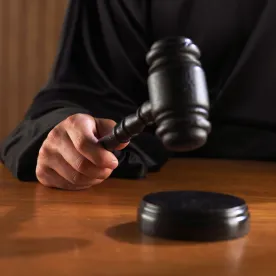While the U.S. Supreme Court has issued decisions on two of its major class action cases this term, Campbell-Ewald Co. v. Gomez and Tyson Foods v. Bouaphekeo, one other previously argued case remains undecided, Spokeo, Inc. v. Robbins. What will happen with this case given the recent passing of Justice Scalia?
The likely result– one no different than before – is that Justice Anthony Kennedy’s “swing vote” will decide the case. If he sides with the “liberal” wing of the Court (Justices Breyer, Ginsburg, Kagan and Sotomayor), a 5-3 decision is likely. If he sides with the remaining “conservative” wing (Justices Alito, Roberts and Thomas), a 4-4 decision is likely, effectively affirming the lower court’s decision.
Spokeo presents the question of whether a plaintiff has standing to bring a class action claim for a statutory violation where no actual harm has occurred. Claimant Robbins sued under the Fair Credit Reporting Act (“FCRA”) after certain inaccurate (but generally favorable) information appeared about him on Spokeo’s “people search” website. He sought payment of the statutory penalties FCRA allows. The U.S. District Court for the Central District of California dismissed the complaint on grounds that Robbins did not have standing because he alleged no “concrete” harm. The Ninth Circuit Court of Appeals, however, reversed, holding that Robbins’ allegations made it plausible that Spokeo had acted with reckless disregard as to its statutory duty to collect accurate information, thus creating standing to sue per the provisions of the FCRA. The case has been expected to resolve a split between the Second and Fourth Circuits on the one hand, which have found no standing in such circumstances, and the Sixth and Seventh Circuits on the other hand, which have gone the other way.
A review of the oral argument before the Court provides some (but not a lot) of information about where the decision may be heading. Justices Sotomayor and Kagan heavily questioned Spokeo’s counsel, and suggested with their questions that they viewed the dissemination of inaccurate information alone a “concrete” injury. Justice Kennedy asked only a handful of questions, but one of them suggested that he found one of Claimant’s arguments (that a person has sustained a monetary injury simply because a statute attaches a monetary penalty for a technical violation) to be circular. Several Justices stayed fairly silent during and asked few questions. Given the tenor of Justice Kennedy’s questioning it is possible that he may vote with the “conservative” wing of the Court, with a 4-4 decision the result, and with the decision of the lower court, and the split between the circuit courts, remaining in place. A decision should be announced soon.





 />i
/>i

